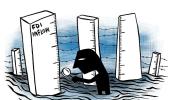With demand for premium and technologically advanced products on the rise, India's Rs 75,000 crore appliances and consumer electronics industry will be switching on to 2022 with hopes of double-digit growth despite anxiety over semiconductor shortage and the impact of the spreading Omicron variant on business.

The industry is expecting double-digit growth on a year-on-year basis, helped by a possible price correction after softening of raw material inputs and factors such as positive sentiments, pent up demand and improving economic conditions.
Besides, a shift in consumer behaviour from price consciousness towards technologically advanced premium products with quality, value proposition and safety aspects leading to a rise in demand for home automation products is making the industry upbeat.
With the government's production linked incentive (PLI) scheme for white goods, which has witnessed a committed investment of Rs 4,614 crore, in place, many manufacturers are gearing up to make the most out of the opportunity as well as take steps towards reducing their dependency on imports and make products more affordable.
Leading players like Samsung, LG and Panasonic have reported consumers getting more tech-savvy in 2021 with growing awareness for Artificial Intelligence (AI) and Internet of Things (IoT) enabled products and expect this trend to gain further momentum next year.
Strong demand for premium segment products such as larger screen TVs, higher capacity refrigerators and washing machines, and especially IoT and AI-enabled products, were witnessed not only from the developed metro markets but also from smaller tier-II towns.
However, the appliances and consumer electronics industry will also have to tackle the shortage of semiconductors, which has resulted in postponement of new launches of smart and connected products.
The Rs 75,000 crore consumer durables industry excludes phones and IT equipment.
Commenting on the outlook for the industry in 2022, Consumer Electronics and Appliances Manufacturers Association (CEAMA) president Eric Braganza said there is optimism over "double-digit growth" but it would depend on a number of variables, including price correction and absence of a third wave of the COVID pandemic.
"Currently, price rise is on the cards, which has the potential to dampen consumer demand but we are optimistic and hopeful that eventually the commodity prices will stabilise due to reduction in global freight and raw material costs and this should have a positive impact on consumer demand," Braganza told PTI.
Sharing similar optimism, Panasonic India Chairman and CEO Manish Sharma said, "At Panasonic, we continue to remain optimistic in 2022. We will continue to move ahead towards our ambitions, with resilience making the most out of our capabilities."
Now, the market is witnessing a shift in consumer behaviour towards premium and connected smart products, he said, adding consumers are now preferring technologically advanced appliances that are connected, energy efficient and easy to use, enabling them to multi-task.
Samsung India senior vice president, Consumer Electronics Business, Raju Pullan said he expects to continue the "strong growth" momentum, having already witnessed double-digit growth led by increased adoption of technology and new form factors and designs.
"We are anticipating strong growth next year and expect premium products to continue leading consumer electronics sales as consumers upsize and are premiumising," he said.
In 2021, the company had witnessed strong demand for premium segment products such as larger screen TVs, higher capacity refrigerators and washing machines, and especially IoT and AI-enabled products.
Interestingly, tier-II towns saw bigger growth this year as most people returned to their hometowns and continued working remotely, Pullan added.
Likewise, LG Electronics India VP - Corporate Planning, Deepak Bansal said consumers are becoming more technology-savvy and there is growing awareness for AI and IOT-enabled consumer durable products.
"Despite caution due to COVID, we are optimistic about 2022," he said, adding that the company will launch an exhaustive product line up based on new consumer insights and trends.
According to Havells CMD Anil Rai Gupta, 2021 also witnessed changes in consumer preferences moving towards reliable and quality brands providing a value proposition, creating opportunity for organised players driving premiumisation of products.
The homegrown firm, like others, is also going to strengthen its omni-channel strategy and maximise its reach by connecting offline stores with online formats.
"While online channels have gained relevance in the new world order, an omni-channel strategy helps to build lasting customer relationships by unifying all a brand's touchpoints.
"We will continue to strengthen our credentials in product development, emerging consumer trends and serving through our strong omni-channel network," Gupta said.
Tata Group firm Voltas witnessed pent-up demand for room air conditioners and its range of cooling products like air coolers and commercial refrigeration after the second wave of the pandemic.
"We are optimistic that in the post-festival season, all categories of cooling products and home appliances will continue to gain ground as witnessed in the previous quarter," Voltas MD and CEO Pradeep Bakshi said.
The company is investing in the manufacturing of Cross Flow Fan (CFF), heat exchangers and plastic moulding components after approval of its proposal under the PLI scheme.
"We are confident that India will soon become a hub for global manufacturing, and we look forward to proudly contributing to the nation's growth story in the year's to come," Bakshi said.
Daikin India chairman and managing director K J Jawa, who is also president of the Refrigeration and Air-conditioning Manufacturers Association (RAMA), expects the cooling industry to cross the pre-pandemic levels and clock around 5 per cent growth over 2019.
Digitalisation as well as online sales have increased, he said.
Photograph: PTI Photo











 © 2025
© 2025